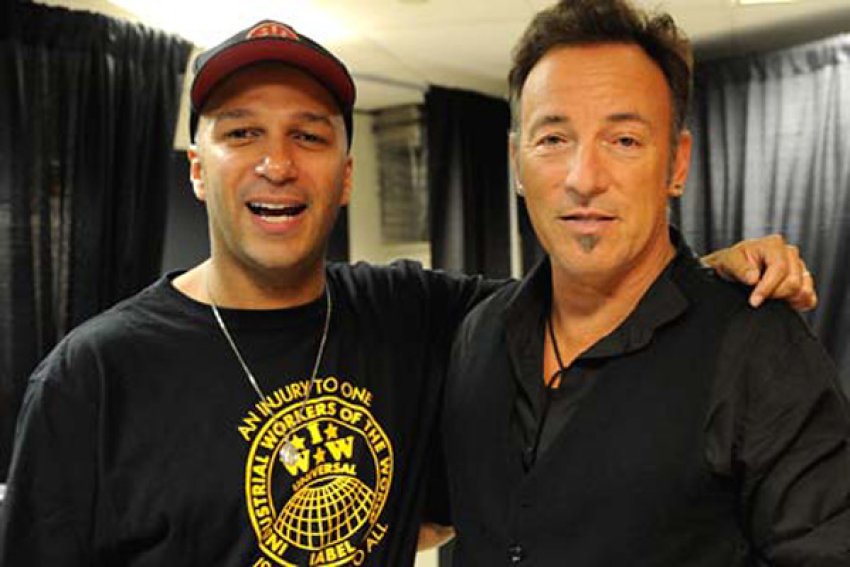
High Hopes
Bruce Springsteen
Columbia
Released January 17, 2014
www.brucespringsteen.net
A recent documentary on veteran US rocker Bruce Springsteen asked fans to describe their hero in three words.
The responses, compiled in the film Springsteen & I, were fairly predictable: "Badass, sensitive, perfect"; "Hope, energy, power”; “Earnest, inspiring, intense” and so on.
The non-Springsteen fans reading this could probably think of a few far less kind words. But if I were to choose three, they would be: "Open to interpretation."
That factor, more than any other, explains Springsteen's huge appeal. To some listeners, he may be singing about driving cars. To others he may be singing about the decline of the car industry. And to others still, he may be singing about the industry bosses and their cronies always being in the driving seat, driving down wages, running over workers' rights and throwing their hard-won conditions into reverse.
Springsteen's ability to pen poetry that means many different things to many different people is unusual. It explains why his last tour was his biggest yet, entertaining 3.5 million people in 26 countries. It explains why the Australian leg kept on adding dates. It explains why, when I eventually managed to get a ticket for his final Sydney show, it was for a seat behind the stage, not in front of it.
Whether I'd got the worst seat in the house was, like most things Springsteen, open to interpretation. It meant I was staring at the back of the Boss's bonce for most of the three-and-a-half hour show. But it also meant I saw things from his perspective: a front row of frightening fanatics backed by an ocean of bored-looking punters who looked unlikely be lulled from their seated stupor. By half-way through Springsteen's sweat-soaked set, he had them all standing. Little wonder he has repeatedly been named the world's best live act.
Video: Bruce Springsteen & The E Street Band - The Ghost of Tom Joad (Live ft. Tom Morello). Bruce Spingsteen.
My cheap seat also meant I got to see what had made Rage Against The Machine's guitarist Tom Morello so scared. Morello had been pulled in for the Australian leg because regular band member Steve Van Zandt had to fulfill acting commitments. Morello, whose solo work as The Nightwatchman has Springsteen stamped all over it, admitted he was nervous to be playing with his hero. He later said he had lived in fear of screwing up on stage - not least because Springsteen's E-Street Band are expected to play any song from the artist's 40-year career at the drop of an audience request.
As Springsteen's new album shows, Morello need not have worried. Springsteen has called the Rage guitarist his "muse" for High Hopes and recorded parts of the album with Morello in Australia.
The album's highlight is undoubtedly Morello's extra-terrestrial, hair-raising solo on "The Ghost Of Tom Joad", a bleak Springsteen offering from 1995 that Rage Against The Machine had previously blown into an explosive epic.
A close second is the cover of Suicide's "Dream Baby Dream". Springsteen has included the word "dream" on every one of his albums and has said all his work measures the distance between the American Dream and American reality. The title track of his 1980 album The River asked: "Is a dream a lie if it don't come true, or is it something worse?" On High Hopes, Suicide's dreamy ditty becomes nightmarish: "Dream, baby, dream, yeah, those dreams keep you free, keep holding on, I just want to see you smile, I just want to see you smile, I just want to see you smile..."
Video: Bruce Springsteen - Dream Baby Dream (Live). Bruce Spingsteen.
Others may interpret it differently, of course. In reviewing the album, most Australian journalists have shied away from the political interpretations. They have instead concentrated on the fact that it is - surprisingly for Springsteen - made up of reinterpretations and covers, including "Just Like Fire Would" by Brisbane punks The Saints. But what is most surprising about the album is its strength - there isn't a filler on it.
Springsteen is returning to tour here again next month. The Australian media have made much of him coming back less than a year after his last appearance, despite the fact he'd previously stayed away for a decade. The likes of The Sydney Morning Herald have made out it is because Australian audiences are so wonderful - rather than the fact that they are relatively wealthy.
Why he is really doing so is probably open to interpretation - but it could well be his last visit for a long time. When Green Left Weekly organised a screening of John Pilger's film "The War You Don't See" in Sydney in 2011, the multi-award-winning journalist told the audience that Springsteen had donated his media-mocking song "57 Channels (And Nothin' On)" for Pilger to use in the closing credits.
Promoting his latest film - Utopia, about Aboriginal disadvantage in Australia - Pilger has said the key to a better life for Aboriginal people here is pressure from overseas. He's right, of course. If there were a call for boycott, divestment and sanctions against Australia, Springsteen might well stay away. If he did so, one thing is certain - there would be as many different opinions on the matter as there are Springsteen fans.
Bruce Springsteen tours Australia from February 5 to 26.
Video: Bruce Springsteen - Just Like Fire Would (Video). Bruce Spingsteen.